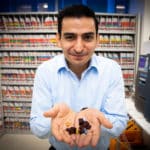New technologies are making natural gas a cheaper and greener fuel
Air quality in China’s cities is improving thanks to government initiatives to reduce urban coal burning. In Beijing, for example, homes, schools, hospitals and factories are switching from coal to gas for heating. As a result, demand for gas has quadrupled over the past decade. Now Australian researchers are partnering with Chinese industry to make gas production even cleaner and more efficient.
Both countries will benefit. China has large gas reserves but much of the gas is in unconventional sources such as coal seam gas and shale gas. The gases from these sources can contain less than 50 per cent methane so impurities such as carbon dioxide and nitrogen must be removed. For nitrogen that usually means cooling the gas to separate the valuable methane from the nitrogen in an energy-intensive process costing billions of dollars.
Continue reading Clean gas, clean air










